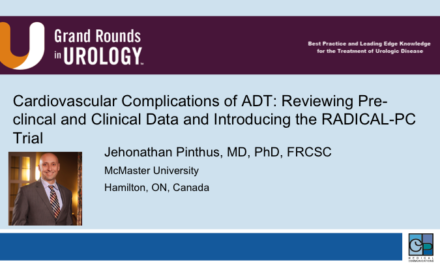Joseph C. Presti, Jr., MD, FACS, presented “Changes in Prostate Cancer Presentation Following the 2012 USPSTF Screening Statement” for the Grand Rounds in Urology audience in October 2020.
How to cite: Presti, Joseph C. “Changes in Prostate Cancer Presentation Following the 2012 USPSTF Screening Statement” October 2020. Accessed Dec 2024. https://dev.grandroundsinurology.com/changes-in-prostate-cancer-presentation-following-the-2012-uspstf-screening-statement/
Changes in Prostate Cancer Presentation Following the 2012 USPSTF Screening Statement – Summary:
Joseph C. Presti, Jr., MD, FACS, urologist at Kaiser Oakland and Regional Leader of Urologic Oncology Surgery for Kaiser Permanente California, reviews data compiled by Kaiser Permanente Northern California in order to discuss how the 2012 United States Preventive Services Task Force (USPSTF) screening statement, which includes the claim that “the harms of screening outweigh the benefits,” has impacted prostate cancer screening practices. Dr. Presti outlines the research process used, which included looking at screening-eligible men and assessing the annual rates of PSA testing, prostate biopsy, cancer incidence, and metastatic disease incidence over the course of a pre-guideline period (2010-2011) and a post-guideline period (2014-2017). The researchers found that although the eligible screening population grew from 404,000 to 524,000, screening rates decreased from 42% to 29%, biopsy rates went from 1.2% to .5%, and prostate cancer detection decreased from 2063 diagnoses to 994 in 2014 but increased to 1528 in 2017. Concerningly, metastatic prostate cancer incidence increased significantly post-statement. Dr. Presti concludes by summarizing the data and discussing the strengths (ability to define a screening-eligible population and a large, diverse sample size) and weaknesses (inability to access family history or look for indolent cancers) of the study.
ABOUT THE AUTHOR
Joseph C. Presti, Jr., MD, FACS, is a urologist at Kaiser Oakland and serves as Regional Leader of Urologic Oncology Surgery for Kaiser Permanente California. Dr. Presti is a Bay Area native, and attended UC Berkeley for his undergraduate education and UC Irvine for medical school. He went on to complete his urology residency at UC San Francisco, followed by a fellowship in urologic oncology at Memorial Sloan-Kettering Cancer Center. He was a member of the faculty at UC San Francisco from 1992 to 2000. He then served as Director of Urologic Oncology at Stanford University for 12 years. Dr. Presti’s research interests have focused on prostate cancer, particularly the refinement of prostate cancer detection strategies.





